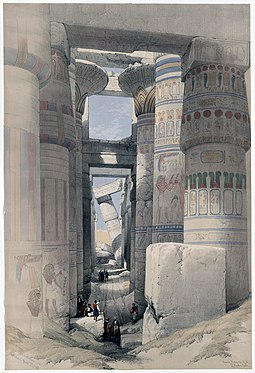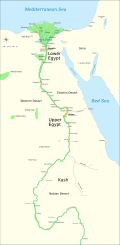Portal:Africa



Africa is the world's second-largest and second-most populous continent after Asia. At about 30.3 million km2 (11.7 million square miles) including adjacent islands, it covers 20% of Earth's land area and 6% of its total surface area. With nearly 1.4 billion people as of 2021, it accounts for about 18% of the world's human population. Africa's population is the youngest among all the continents; the median age in 2012 was 19.7, when the worldwide median age was 30.4. Based on 2024 projections, Africa's population will reach 3.8 billion people by 2099. Africa is the least wealthy inhabited continent per capita and second-least wealthy by total wealth, ahead of Oceania. Scholars have attributed this to different factors including geography, climate, corruption, colonialism, the Cold War, and neocolonialism. Despite this low concentration of wealth, recent economic expansion and a large and young population make Africa an important economic market in the broader global context. Africa has a large quantity of natural resources and food resources, including diamonds, sugar, salt, gold, iron, cobalt, uranium, copper, bauxite, silver, petroleum, natural gas, cocoa beans, and.
Africa straddles the equator and the prime meridian. It is the only continent to stretch from the northern temperate to the southern temperate zones. The majority of the continent and its countries are in the Northern Hemisphere, with a substantial portion and a number of countries in the Southern Hemisphere. Most of the continent lies in the tropics, except for a large part of Western Sahara, Algeria, Libya and Egypt, the northern tip of Mauritania, and the entire territories of Morocco and Tunisia, which in turn are located above the tropic of Cancer, in the northern temperate zone. In the other extreme of the continent, southern Namibia, southern Botswana, great parts of South Africa, the entire territories of Lesotho and Eswatini and the southern tips of Mozambique and Madagascar are located below the tropic of Capricorn, in the southern temperate zone.
Africa is highly biodiverse; it is the continent with the largest number of megafauna species, as it was least affected by the extinction of the Pleistocene megafauna. However, Africa is also heavily affected by a wide range of environmental issues, including desertification, deforestation, water scarcity, and pollution. These entrenched environmental concerns are expected to worsen as climate change impacts Africa. The UN Intergovernmental Panel on Climate Change has identified Africa as the continent most vulnerable to climate change.
The history of Africa is long, complex, and varied, and has often been under-appreciated by the global historical community. In African societies the oral word is revered, and they have generally recorded their history via oral tradition, which has led anthropologists to term them oral civilisations, contrasted with literate civilisations which pride the written word. During the colonial period, oral sources were deprecated by European historians, which gave them the impression Africa had no recorded history. African historiography became organized at the academic level in the mid-20th century, and saw a movement towards utilising oral sources in a multidisciplinary approach, culminating in the General History of Africa, edited by specialists from across the continent. (Full article...)
Selected article –

Saharan rock art is a significant area of archaeological study focusing on artwork carved or painted on the natural rocks of the central Sahara desert. The rock art dates from numerous periods starting c. 12,000 years ago, and is significant because it shows the culture of ancient African societies.
The paintings and carvings of the Sahara are endangered, and vulnerable rock art on uncovered rock has already disappeared. Organizations, such as the Trust for African Rock Art, are researching and recording as much information about Saharan rock art as possible, while raising awareness of threats to the art itself. (Full article...)
Featured pictures –
Did you know (auto-generated) -

- ... that Olive MacLeod journeyed 6,000 km (3,700 mi) through Africa in 1910–1911 to visit her murdered fiancé's grave, and wrote a book based on her observations?
- ... that scientists tested the age of an African termite's inhabited mound—and found it to be 34,000 years old?
- ... that in 2019 the South African army's Natal Carbineers were renamed the Ingobamakhosi Carbineers, after a Zulu regiment that had fought against them at the 1879 Battle of Isandlwana?
- ... that the South Australian Labor politician Ernest Roberts served two tours in South Africa during the Second Boer War?
- ... that The Red Moon was the first Broadway show to depict alliances between African Americans and Native Americans?
- ... that South African politician Speedy Mashilo was kidnapped for seven hours?
Categories
Selected biography –
Albert Camus (/kæˈmuː/ ka-MOO; French: [albɛʁ kamy] ⓘ; 7 November 1913 – 4 January 1960) was a French philosopher, author, dramatist, journalist, world federalist, and political activist. He was the recipient of the 1957 Nobel Prize in Literature at the age of 44, the second-youngest recipient in history. His works include The Stranger, The Plague, The Myth of Sisyphus, The Fall and The Rebel.
Camus was born in French Algeria to pied-noir parents. He spent his childhood in a poor neighbourhood and later studied philosophy at the University of Algiers. He was in Paris when the Germans invaded France during World War II in 1940. Camus tried to flee but finally joined the French Resistance where he served as editor-in-chief at Combat, an outlawed newspaper. After the war, he was a celebrity figure and gave many lectures around the world. He married twice but had many extramarital affairs. Camus was politically active; he was part of the left that opposed Joseph Stalin and the Soviet Union because of their totalitarianism. Camus was a moralist and leaned towards anarcho-syndicalism. He was part of many organisations seeking European integration. During the Algerian War (1954–1962), he kept a neutral stance, advocating a multicultural and pluralistic Algeria, a position that was rejected by most parties. (Full article...)
Selected country –
 |
 |
|

| ||
Seychelles, officially the Republic of Seychelles (French: République des Seychelles; Creole: Repiblik Sesel), is an archipelago nation of 155 islands (115 islands and 40 islets) in the Indian Ocean, some 1,500 km east of mainland Africa, northeast of the island of Madagascar. It consists of 42 granitic islands, two coral sand cays north of the granitics, two coral islands south of the granitics, 29 coral islands in the Amirantes group, west of the granitics, 13 coral islands in the Farquhar Group, south-south west of the Amirantes, and 67 raised coral islands in the Aldabra Group, west of the Farquhar Group. Seychelles has the smallest population of any sovereign state of Africa.
The Seychelles president, who is both head of state and head of government, is elected by popular vote for a five-year term of office. The previous president, France-Albert René, first came to power in a coup d'état in 1977, one year after independence. He was democratically elected after the constitutional reforms of 1992. He stood down in 2004 in favour of his vice-president, James Michel, who was re-elected in 2006. (Read more...)
Selected city –

Giza (/ˈɡiːzə/; sometimes spelled Gizah, Gizeh, Geeza, Jiza; Arabic: الجيزة, romanized: al-Jīzah, pronounced [ald͡ʒiːzah], Egyptian Arabic: الجيزة el-Gīza [elˈgiːzæ]) is the third-largest city in Egypt by area after Cairo and Alexandria; and fourth-largest city in Africa by population after Kinshasa, Lagos, and Cairo. It is the capital of Giza Governorate with a total population of 4,872,448 in the 2017 census. It is located on the west bank of the Nile opposite central Cairo, and is a part of the Greater Cairo metropolis. Giza lies less than 30 km (18.64 mi) north of Memphis (Men-nefer, today the village of Mit Rahina), which was the capital city of the unified Egyptian state during the reign of pharaoh Narmer, roughly 3100 BC.
Giza is most famous as the location of the Giza Plateau, the site of some of the most impressive ancient monuments in the world, including a complex of ancient Egyptian royal mortuary and sacred structures, among which are the Great Sphinx, the Great Pyramid of Giza, and a number of other large pyramids and temples. Giza has always been a focal point in Egypt's history due to its location close to Memphis, the ancient pharaonic capital of the Old Kingdom. (Full article...)
In the news
- 6 February 2025 – Kivu conflict
- Malawian President Lazarus Chakwera orders Malawian troops to withdraw from peacekeeping operations in the Democratic Republic of the Congo as the crisis escalates. Three Malawian soldiers have been killed in recent fighting in North Kivu. (BBC News)
- 6 February 2025 – Islamist insurgency in the Sahel
- Ten Nigerien soldiers are killed in an ambush by Islamic State fighters near the border with Burkina Faso. (AP)
- 5 February 2025 – War against the Islamic State
- A deadly battle between the Puntland Security Force and Islamic State results in the killing of 57 foreign militants in Dharin area of Bari Region, Puntland. (Garowe Online)
- Puntland Maritime Police Force seize a boat carrying illegal military supplies, uniforms and equipment. The vessel was taken captive off the coast of the Qaw district in the Bari Region, Somalia. (The East African)
- 5 February 2025 – Sudanese civil war
- Battle of Khartoum
- The UNICEF confirms that several children have been killed in Khartoum, Sudan, in the past few days. (UNICEF) (The Peninsula Qatar)
Updated: 21:05, 7 February 2025
General images -
Africa topics
More did you know –
- ... that Dutch malacologist Adolph Cornelis van Bruggen is an expert in African land snails?
- ... that a 20‑day study reported by BirdLife International discovered 265 species of birds in Nki National Park?
- ... that Kalulu, an African boy who died in 1877, was modeled in Madame Tussauds and attended Dr. Livingstone's funeral in London?
- ... that Samuel Jackman Prescod became the first person of African descent elected to the Parliament of Barbados?
Related portals
Major Religions in Africa
North Africa
West Africa
Central Africa
East Africa
Southern Africa
Associated Wikimedia
The following Wikimedia Foundation sister projects provide more on this subject:
-
Commons
Free media repository -
Wikibooks
Free textbooks and manuals -
Wikidata
Free knowledge base -
Wikinews
Free-content news -
Wikiquote
Collection of quotations -
Wikisource
Free-content library -
Wikispecies
Directory of species -
Wikiversity
Free learning tools -
Wikivoyage
Free travel guide -
Wiktionary
Dictionary and thesaurus























































































